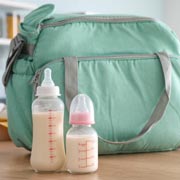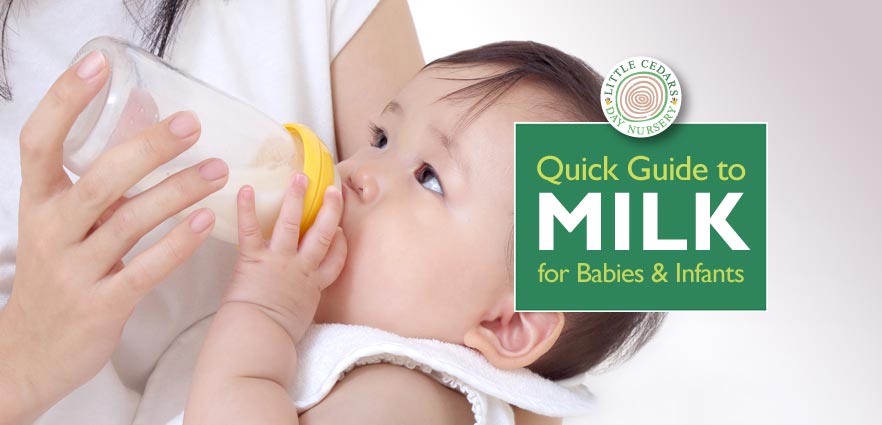Quick Guide to Milk for Babies & Infants
As promised in our last post, we next take look at the many types of milk for babies and infants in the UK. There really are a myriad of options, so this guide should prove useful and help make sense of the choices available.
Breast Milk
 Our “Benefits of Breastfeeding” post described in great detail how breast milk really is nature’s perfect food for babies. It’s tailored to the needs of the baby and even adapts as the baby grows. As well as essential vitamins, minerals, fats and proteins, it also passes antibodies, hormones and polyunsaturated fatty acids to the baby. All these things are incredibly important to the growing infant and many are simply not possible with formula milk and alternatives to breast milk. That said, there are many reasons why parents may switch to other alternatives and that’s where today’s guide should prove most useful.
Our “Benefits of Breastfeeding” post described in great detail how breast milk really is nature’s perfect food for babies. It’s tailored to the needs of the baby and even adapts as the baby grows. As well as essential vitamins, minerals, fats and proteins, it also passes antibodies, hormones and polyunsaturated fatty acids to the baby. All these things are incredibly important to the growing infant and many are simply not possible with formula milk and alternatives to breast milk. That said, there are many reasons why parents may switch to other alternatives and that’s where today’s guide should prove most useful.
Formula Milk
 The variety of formula milks is surprisingly large, not helped by the fact that different brands call some of them by different names. Some products and names also seem to have been developed in order to cover small niches, many of which are actually already adequately covered by larger, existing product lines (‘Toddler Milk’ and ‘Growing-Up Milk’ are two examples cited by the NHS). Then add in the fact that many are sold as liquid and also as powder that needs to be made up. The choice can be overwhelming.
The variety of formula milks is surprisingly large, not helped by the fact that different brands call some of them by different names. Some products and names also seem to have been developed in order to cover small niches, many of which are actually already adequately covered by larger, existing product lines (‘Toddler Milk’ and ‘Growing-Up Milk’ are two examples cited by the NHS). Then add in the fact that many are sold as liquid and also as powder that needs to be made up. The choice can be overwhelming.
Safety Tip: Check expiry dates! Ready-made liquid formula milk, in particular, has a shorter shelf life. The most important thing of all, however, is to carefully read the labels to ensure that the milk is age appropriate i.e. suited perfectly to the age of the baby or infant it’s intended for. Parents should also, of course, be mindful that some brands or formula milk types may disagree with their infant, so should be avoided. If in doubt, always ask your GP, midwife or health visitor for advice.
The Standard First Formula Milk for Babies (0-12 Months):
More ‘Niche’ Types of Formula Milk:
Baby Under One? Avoid These Milks!
Don’t be tempted to feed your baby any of the following types of milk if they are under 12 months of age (click the titles for more information about each):
Soya Milk
Avoid soya milk for babies under one, along with any other similar drinks described as ‘milks’.
Oat Milk
Avoid oat milk for babies under one, along with any other similar drinks described as ‘milks’.
Rice Milk
Avoid rice milk for babies under one, along with any other similar drinks described as ‘milks’.
Almond Milk
Avoid almond milk for babies under one, along with any other similar drinks described as ‘milks’.
Rice Drinks
Avoid rice drinks for babies and children up to the age of five. It contains arsenic!
Condensed Milk
Also known as evaporated milk, condensed milk is usually made from cows’ milk that’s had roughly 60% of the water content evaporated off. Sometimes it contains added sugar. Avoid!
Dried Milk
Also known as powdered milk or milk powder, dried milk is milk powder made by evaporating all the water content. Avoid!
Cows’ Milk
Cows’ milk is only OK if used in the process of cooking food (NOT as a drink) and, even then, only so long as it’s been pasteurised. It is OK as a drink after the age of 1 if it has been pasteurised. It does not contain enough iron for children under one.
Goats’ Milk
Goats’ milk is only OK if used in the process of cooking food (NOT as a drink) and, even then, only so long as it’s been pasteurised. It is OK as a drink after the age of 1 if it has been pasteurised. It does not contain enough iron for children under one.
Sheep’s Milk
Sheep’s milk is only OK if used in the process of cooking food (NOT as a drink) and, even then, only so long as it’s been pasteurised. It is OK as a drink after the age of 1 if it has been pasteurised. It does not contain enough iron for children under one.
Semi-Skimmed Milk
Semi-skimmed milk, also known as 1% milk, is NOT suitable for children under five because it does not have a high enough calory content.
From 12 Months
No sooner than 12 months of age, your infant can move on to whole cows’, sheep’s or goats’ milk but it MUST be pasteurised in all cases as well as being part of a healthy and balanced diet.
From the Age of 2
Once they reach the age of 2, they can drink semi-skimmed cows’ milk on the proviso that it’s part of a healthy, balanced diet, they are not underweight and are growing at a suitable rate for their age etc.
Vitamin Supplements
The NHS recommends vitamin supplements for children from the age of 6 months up to 5 years. Vitamin A, Vitamin C and Vitamin D are available as drops for this age group.
Milk at Little Cedars Day Nursery, Streatham
 If parents/guardians of babies and infants at Little Cedars Nursery have breast milk or a specific formula milk that they would like us to feed their child, we are happy to do so. They simply need to supply it, preferably in a cool bag, when they drop their child off. However, we ask them to label their child’s milk and bottle(s) etc. for identification purposes. We are happy to make up their chosen formula milk from powder, so there’s no need for parents/guardians to make it up themselves.
If parents/guardians of babies and infants at Little Cedars Nursery have breast milk or a specific formula milk that they would like us to feed their child, we are happy to do so. They simply need to supply it, preferably in a cool bag, when they drop their child off. However, we ask them to label their child’s milk and bottle(s) etc. for identification purposes. We are happy to make up their chosen formula milk from powder, so there’s no need for parents/guardians to make it up themselves.
 Little Cedars is an wonderful nursery/pre-school in Streatham (rated officially as ‘Good’ in every category by Ofsted). It’s near Streatham Common, Streatham Hill, Streatham Park, Furzedown, Tooting, Tooting Bec, Tooting Broadway, Tooting Common, Balham, Norbury and Colliers Wood, so would also be convenient for parents living or working in those locations. Please get in touch if you have any questions, would like to visit the setting or would simply like to apply for a place for your baby or child:
Little Cedars is an wonderful nursery/pre-school in Streatham (rated officially as ‘Good’ in every category by Ofsted). It’s near Streatham Common, Streatham Hill, Streatham Park, Furzedown, Tooting, Tooting Bec, Tooting Broadway, Tooting Common, Balham, Norbury and Colliers Wood, so would also be convenient for parents living or working in those locations. Please get in touch if you have any questions, would like to visit the setting or would simply like to apply for a place for your baby or child:




